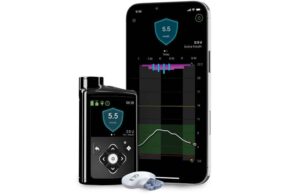
Data shared at ATTD 2024 in Florence, Italy, included the largest set of data from early users in the U.S. Results built upon three-year data from more than 100,000 real-world users who outperformed international time in range targets.
Medtronic’s MiniMed 780G, its latest-generation automated insulin delivery system, won FDA approval in April 2023. The current iteration uses the latest Guardian 4 technology and requires no fingersticks while in “SmartGuard” mode. It provides meal detection technology providing automatic adjustments and corrections to sugar levels every five minutes. This occurs for both basal (background) and bolus (mealtime) insulin needs.
MiniMed 780G with Guardian 4 offers insulin to account for when users forget to bolus or underestimate the number of carbs in their meal. Medtronic also has a newer version on the way, with the system garnering CE mark with the next-generation Simplera Sync sensor in January.
Medtronic data highlights its pump’s ability to achieve time in tight range
New data presented by Medtronic aimed to evaluate MiniMed 780G’s ability to help users achieve time in tight range (TITR) goals. This newer metric more closely mirrors the glucose levels of individuals without diabetes. The company defines it as the percentage of time a person spends in the glucose range of 70-140 mg/dL.
Results from Medtronic showed that users (13,461) achieved a TITR of greater than 56% when using recommended optimal settings. The company defines these optimal settings as 100 mg/dL set target with an active insulin time of 2 hours.
“Since the landmark DCCT study, numerous retrospective studies have demonstrated the association between increased time in range and a reduction of diabetic complications. There’s no doubt elevated glucose is harmful and the average blood sugars of those living with type 1 diabetes are higher than we should accept as a clinical community,” said Dr. Robert Vigersky, chief medical officer, Medtronic Diabetes. “The preponderance of data across randomized controlled trials and real-world studies show that the MiniMed 780G system is maximizing time in range far surpassing international targets and is taking it a step beyond by getting people closer to euglycemia.
“In the absence of a cure, our goal is to relentlessly innovate therapies to help people maximize their health without adding burden, which our newest AID system has proven to do.”
More MiniMed 780G data
Dr. James Thrasher, founder of the Arkansas Diabetes and Endocrinology Center, presented MiniMed 780G data at ATTD. He shared results from 7,499 real-world MiniMed 780G users with type 1 diabetes.
Results showed that users achieved more than 80% time in range when employing the recommended optimal settings. This exceeded international glycemic targets of 70% time in range with closed loop exits occurring less than once per week on average.
Enhancements to the latest system also resulted in high satisfaction and improved quality of life, Medtronic said. A U.S. pump patient survey of 1,997 users found that the system scored first in overall pump satisfaction. It also showed that, among people with type 1 diabetes using CGM, Guardian 4 mirrored competitor sensors in overall satisfaction.
“The results demonstrate that when the MiniMed 780G system is optimized with recommended optimal settings, it helps people with diabetes far exceed the ADA recommended goal of 70% time in range,*” said Thrasher. “The advent of AID systems has been nothing short of transformative in the practice of endocrinology and is really pushing all of us to introduce its protective benefits on overall health as early and often as possible. This data reinforces that the determinant of choice for AID systems should be first and foremost the power of the algorithm.”

